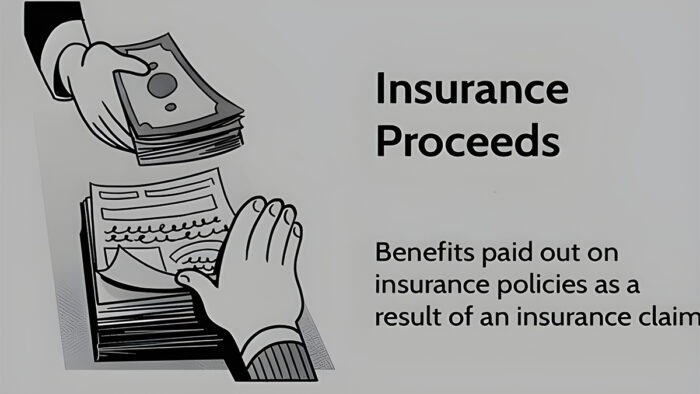Insurance proceeds are the funds or money paid out to the policyholder or beneficiaries by the insurance provider when they file a claim against a covered event following the terms of the insurance policy.

Apart from this, insurance proceeds are expected to reimburse policyholders or beneficiaries for losses and offer financial support, as stated in the coverage details of the quote.
How Does It Work?
If a situation triggers the policyholder to file a claim, like a car accident, death, or property damage, receiving insurance proceeds will begin.
Besides, the beneficiary or policyholder must file the claim with the insurance provider directly and provide proof of the loss or event, as well as the necessary documents.
Then, the insurance company will review the claim to make sure that it meets the policy terms and that the required paid-out amount is calculated.
After the claim has been approved, the insurance proceeds are paid out to the policyholder or beneficiary through regular installments or lump sum payments in most cases.
Types of Insurance and Their Proceeds
The insurance proceeds differ by the type of insurance or policy. Here is a better understanding of what I mean:
- Life Insurance
This ensures the policyholder’s life and pays out benefits to their beneficiaries upon their death after a particular period. Then, the proceeds will cover ongoing living expenses, future educational expenses for dependents, funeral costs, and debts.
- Health Insurance
The benefits from this type of insurance cover medication costs, medical treatments, long-term care expenses (occasionally), and surgeries. The policyholder or the healthcare providers receive the proceeds directly.
- Property and casualty insurance
Auto, homeowners, and liability insurance are part of this category. The funds received from the proceeds are used to cover legal costs, replace or repair damaged properties, and cover other additional expenses.
- Disability Insurance
The proceeds from this type of insurance offer income replacement to the policyholder if they are not able to work because of a disability. They are usually paid as a portion of the insured’s salary.
How to Manage Insurance Proceeds
It may seem overwhelming when you get a large sum of money from insurance proceeds. However, it is also important that you handle the money and use it wisely to make sure its purpose is met. Here are a few tips you can use to manage the funds from your insurance benefits:
- Create a budget.
- Consider investing.
- Consult a financial advisor or professional.
When you do the following, you can be able to spend and manage the insurance benefits wisely and carefully.
Frequently Asked Questions
How do I file a claim to receive insurance proceeds?
To file a claim, you must first contact your insurance provider and tell them about the covered events. Next, prepare and provide all the necessary documents and information, like medical records, death certificates, or property damage estimates; and lastly, complete or fill out the claim forms.
After this, the insurance company will assess the claim and confirm it meets the terms of the quote before disbursing the funds to the claimant.
Are insurance proceeds taxable?
The answer to whether or not insurance proceeds are taxable depends on the type of insurance and the situation.
How long does it take to receive insurance proceeds after filing a claim?
The insurance claim-processing approval time after filing a claim differs depending on the seriousness of the claim and the type of insurance.
In most cases, it takes 30 to 60 days before the insurance benefits are disbursed. Other claim types may take longer.
Are there different ways to receive insurance proceeds?
Depending on the policy type, you may receive the insurance proceeds as regular installments or a lump-sum payment. This means that there are various ways that you can get it
Can I designate someone else to receive my insurance benefits?
Yes, most insurance quotes allow policyholders to designate or give one or more beneficiaries who will get the benefits directly upon your death or the covered event.
What happens if an insurance company disputes a claim?
If an insurance provider disagrees with a claim, it is advisable to check your policy terms, consult legal counsel if required, and provide extra documentation and evidence demanded by the insurance company.



